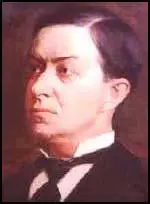William Goebel

William Goebel, the son of German immigrants, was born in Sullivan County, Pennsylvania on 4th January, 1856. After graduating from Cincinnati Law School in 1877 he specialized in corporate and railroad law in Kentucky.
A member of the Democratic Party he was elected to to the Senate in Kentucky in 1887. Over the next thirteen years Goebel developed a reputation as a progressive and supported the civil rights of African Americans, women and trade unions.
Goebel also joined some other important political figures in calling for the abolition of lotteries and an end to the monopoly on state school textbooks. Goebel made many enemies and after one conflict, a local politician, John Stanford was killed. Goebel was charged with his murder but was acquitted in 1895.
In 1899 the Democratic Party selected Goebel as its candidate for governor of Kentucky whereas the Republican Party chose William Sylvester Taylor. The election was controversial and there were claims of ballot rigging. When the vote was announced, Taylor won by 193,714 to 191,331.
When the Democratic Party challenged the result of the election, threats were made that if Goebel won on appeal, he would be assassinated. Goebel was given bodyguards but on 30th January, 1900, while Goebel was entering the State House, a gun was fired from the window of the Secretary of State's office.
Goebel was taken to hospital and while receiving treatment it was announced that as a result of the investigation he was now the governor of Kentucky. However William Goebel died of his wounds on 3rd February, 1900. William Sylvester Taylor fled to Indiana and refused to return to face charges of conspiring to murder Goebel. Several men were arrested including Caleb Powers, Kentucky's Secretary of State. Eventually Henry Youtsey and Jim Howard were convicted of murder while five others including Powers were found guilty of conspiracy.
In 1907 an article by Fred Warren, the editor of Appeal to Reason, complained about the failure of the authorities to arrest and charge William Sylvester Taylor with murder. When Warren advertised a reward of $1,000 for the arrest of Taylor, Warren was himself arrested and charged with encouraging others to commit the crime of kidnap. After a two year delay, Warren was found guilty and sentenced to six months hard labour and a $1,500 fine.
On 13th June, 1908, the Governor of Kentucky, Augustus Everett Willson, pardoned William Sylvester Taylor, Caleb Powers, . The following year he pardoned William Sylvester Taylor and all the other men indicted for Goebel's murder, except for Henry Youtsey, whom Willson said was obviously the murderer.
